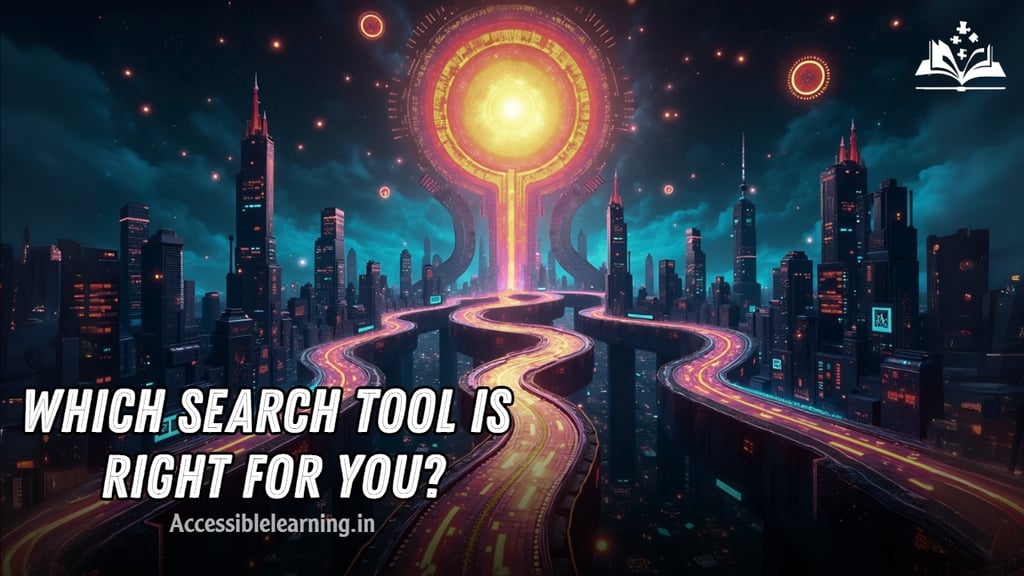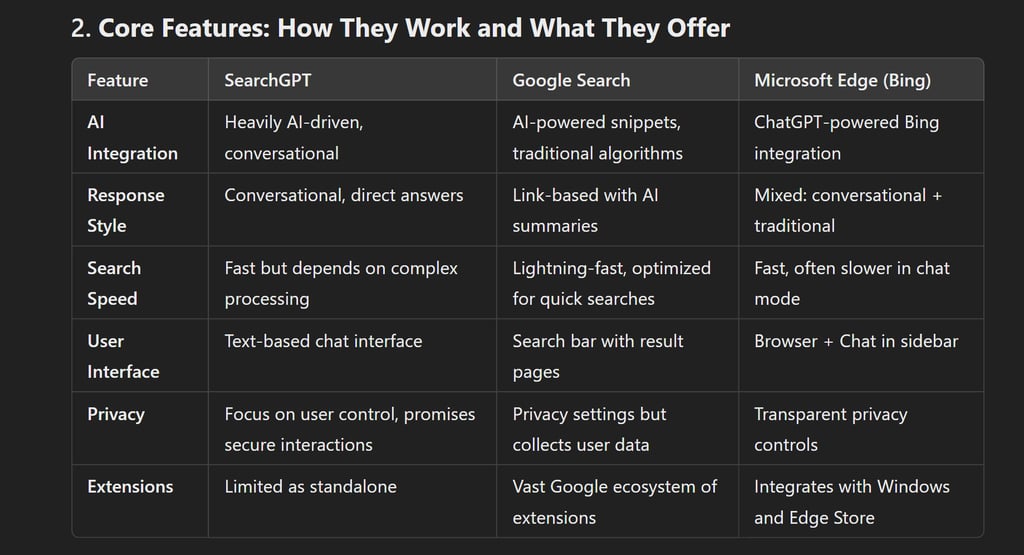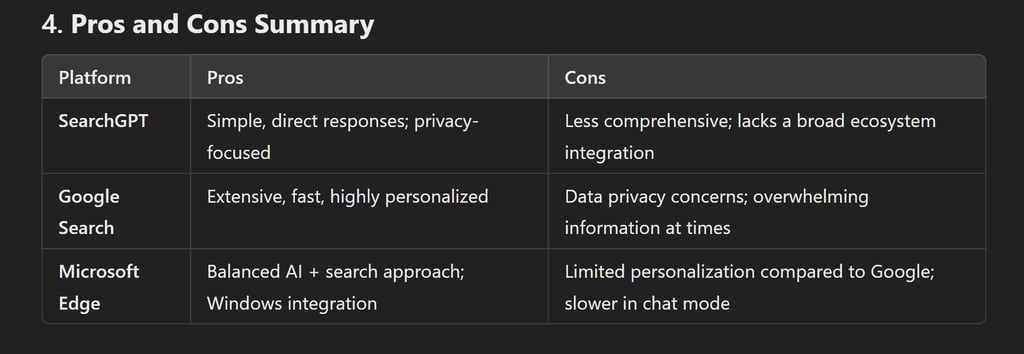
SearchGPT vs. Google Search vs. Microsoft Edge: Which Search Tool is Right for You?
We explore three top search tools—SearchGPT, Google Search, and Microsoft Edge with Bing—to help you choose the right one for your needs. We analyze their features, strengths, and weaknesses across key aspects like AI integration, personalization, privacy, multimedia capabilities, and ecosystem compatibility. Discover how each platform excels, where they fall short, and which one is best suited for different types of users, from privacy-conscious individuals to those deeply embedded in tech ecosystems.
SEARCH ENGINEAI/FUTURECOMPANY/INDUSTRYEDITOR/TOOLS
Sachin K Chaurasiya
11/9/20247 min read


In today’s world, the choice of a search tool isn’t just about finding answers quickly. It's about personalization, privacy, AI integration, and seamless usability across devices. Here, we’ll dive deep into three leading platforms—SearchGPT, Google Search, and Microsoft Edge—exploring their strengths, weaknesses, and what makes each of them unique.
SearchGPT
SearchGPT is an AI-based search assistant developed by OpenAI. Unlike traditional search engines, it provides a conversational, interactive experience, focusing on delivering concise, accurate responses rather than a list of links.
Key Functionalities
Search and AI Response Quality
Strength: Its conversational approach is ideal for users seeking direct answers or in-depth insights without sifting through pages.
Weakness: Limited in scope compared to Google’s breadth, as it relies on pre-trained datasets rather than a constantly refreshed search database.
Personalization and User Experience
Strength: Offers a highly personal question-and-answer experience that’s especially valuable for in-depth learning or quick advice.
Weakness: Lacks extensive user-specific customization, meaning it might not prioritize user-preferred sources.
Privacy and Data Control
Strength: SearchGPT focuses on user control over privacy, collecting minimal data compared to other platforms. It promises to be less invasive, aligning with OpenAI’s data practices.
Weakness: Limited options for adjusting privacy settings as it’s not as embedded in a larger ecosystem.
Ecosystem and Compatibility
Strength: Flexible in accessing specific, concise answers without requiring additional extensions or software, making it useful for focused inquiries.
Weakness: Standalone experience without the broad ecosystem compatibility of Google or Edge, as it’s not tied to a specific platform.
Learning Capabilities and Contextual Understanding!
Strength: Advanced contextual understanding due to OpenAI’s conversational AI models. It remembers the context of the conversation within a session, allowing for follow-up questions without rephrasing.
Weakness: Doesn’t retain context across sessions, meaning it resets each time, which may not suit users looking for ongoing personalized interactions.
Voice Search and Accessibility
Strength: Has voice recognition capabilities, but these are often more limited than Google’s or Microsoft’s integrated voice assistants.
Weakness: Lack of deep integration with devices limits voice search potential.
Multimedia and Visual Search
Strength: Provides detailed, text-based responses rather than multimedia, making it a straightforward tool for text-based inquiries.
Weakness: Lacks dedicated multimedia search capabilities, meaning users will not find image or video results directly.
Ad-Free Experience and Monetization
Strength: Typically provides an ad-free experience, focusing on user queries without distractions, which enhances usability.
Weakness: Not monetized through ads, but it may require subscription or usage-based fees for more advanced features, depending on OpenAI’s pricing.
Cross-Device Syncing and Integration
Strength: Accessed primarily as a standalone tool, making it easily accessible across devices without needing deep integration.
Weakness: Lacks seamless syncing across devices as it’s not built into a larger ecosystem.
Future Potential and Updates
Strength: As part of OpenAI’s rapidly developing AI suite, SearchGPT is likely to see significant improvements in natural language understanding, personalization, and possibly multimedia support.
Weakness: As a relatively new tool, it’s still in development, so it may not yet offer the robustness that Google and Microsoft provide.


Google Search
As the world’s most widely used search engine, Google Search has a database covering vast topics and answers, driven by Google’s powerful algorithms and personalized recommendations. It provides a mix of information, news, images, and shopping insights.
Key Functionalities
Search and AI Response Quality
Strength: Google’s traditional search results are thorough, and its AI snippets are a helpful addition for quick answers, especially in niche areas.
Weakness: With so much data, results can sometimes feel overwhelming, and Google's ranking is often influenced by SEO, sometimes showing older or promotional content.
Personalization and User Experience
Strength: It’s extensively personalized, learning user preferences over time and delivering results based on previous searches, locations, and interests.
Weakness: Some users find Google's personalization intrusive, as it relies heavily on tracking user activity.
Privacy and Data Control
Strength: Offers a comprehensive privacy control suite, allowing users to monitor and adjust data collection.
Weakness: Despite privacy options, Google’s business model relies heavily on advertising and data collection, which can make privacy-conscious users wary.
Ecosystem and Compatibility
Strength: It seamlessly connects to Google’s entire suite—Gmail, YouTube, Google Maps, etc.—creating an ecosystem that syncs across devices.
Weakness: Dependence on Google’s services can make switching to other platforms difficult for users deeply embedded in this ecosystem.
Learning Capabilities and Contextual Understanding
Strength: Uses historical data and browsing habits to adapt responses and display more relevant results based on past behavior, enabling a “learning” experience over time.
Weakness: Contextual understanding is limited to offering related search suggestions, and it often lacks true conversational flow unless using its AI assistant (Google Bard).
Voice Search and Accessibility
Strength: Google Assistant integration makes voice search seamless and accessible across Android devices and Google Home products, supporting hands-free search.
Weakness: While accessible, it’s heavily dependent on the Google ecosystem, potentially reducing compatibility with other platforms.
Multimedia and Visual Search
Strength: Has excellent multimedia search, including Google Images, YouTube, and Google Lens for visual search, providing a rich multimedia experience.
Weakness: Overwhelming options can sometimes detract from a streamlined, text-focused search experience.
Ad-Free Experience and Monetization
Strength: Free to use and comprehensive, with ads clearly marked, which generates revenue and keeps the service free for users.
Weakness: Ads are embedded in the search results, sometimes causing users to scroll to find genuine answers and creating a cluttered experience.
Cross-Device Syncing and Integration
Strength: Seamless cross-device syncing when signed into a Google account, which means users can pick up searches on any device without interruption.
Weakness: Strongly linked to Google services, which may require users to stick to the Google ecosystem to experience full functionality.
Future Potential and Updates
Strength: Consistent updates and AI-powered features, including Google’s integration of Bard, indicate a strong commitment to staying on the cutting edge of search technology.
Weakness: Balancing AI integration with its traditional search model may slow down the transition to a fully conversational experience.


Microsoft Edge
Microsoft Edge, which includes Bing’s AI-powered capabilities, has transformed into more than just a browser. Integrated with Bing Chat and ChatGPT capabilities, it offers a conversational experience alongside traditional search results.
Key Functionalities
Search and AI Response Quality
Strength: The integration of Bing Chat with ChatGPT brings a mix of traditional and AI-powered conversational search, useful for a balanced experience.
Weakness: Bing’s responses can sometimes lag behind Google’s for niche topics, as it uses both a search and a chat interface, which can slow down the response.
Personalization and User Experience
Strength: Balances personalization with privacy, especially appealing to Windows users who benefit from Microsoft’s secure user data protocols.
Weakness: Personalization isn’t as refined as Google’s, making it less intuitive for some users.
Privacy and Data Control
Strength: Transparent privacy features with strong integration across Windows, making it easier for users to adjust settings.
Weakness: While more private than Google, Microsoft still collects substantial data, especially on Windows devices.
Ecosystem and Compatibility
Strength: Integrates deeply with Windows and Office, ideal for Windows users who use Microsoft’s productivity suite.
Weakness: Less optimized for non-Windows devices, though recent improvements have made it more accessible on iOS and Android.
Learning Capabilities and Contextual Understanding
Strength: Bing Chat remembers context within conversations, which makes it great for research or projects where users need continuity between questions.
Weakness: Similar to SearchGPT, it doesn’t carry context across different sessions, which can make ongoing research projects more challenging.
Voice Search and Accessibility
Strength: Integrated with Cortana and Windows’ voice controls, it offers smooth voice search on Windows devices and in Edge.
Weakness: Limited accessibility on non-Windows devices, though improving.
Multimedia and Visual Search
Strength: Bing’s visual search and integration with image search are quite effective, with AI enhancements to improve results, making it a strong contender in multimedia search.
Weakness: Slightly limited compared to Google’s extensive multimedia database, especially for niche video or lesser-known images.
Ad-Free Experience and Monetization
Strength: Ad-free experience in its chat interface, while traditional Bing Search incorporates ads that are often well-marked.
Weakness: While less aggressive than Google, ads are still present, especially in standard search results, potentially detracting from the user experience.
Cross-Device Syncing and Integration
Strength: Syncs efficiently across Windows devices and provides a similar experience on mobile apps, enabling a smooth transition between devices.
Weakness: Although improving on iOS and Android, full syncing and integration are still better suited for Windows-based users.
Future Potential and Updates
Strength: Rapid development as it integrates ChatGPT advancements, showing a strong commitment to AI-driven search.
Weakness: Could face limitations as it balances Edge’s traditional browser functionality with Bing’s evolving AI-based interface.




Use Cases: Which One Fits Your Needs?
For Quick, Direct Answers: If you want an immediate response without sifting through pages of links, SearchGPT might be your go-to option, as it directly provides conversational answers.
For Comprehensive Searches and Personalization: Google Search is ideal for users who need robust, constantly updated information and don’t mind Google’s data collection for the sake of personalized results.
For a Balanced Experience with Privacy Control: Microsoft Edge (Bing) offers a mix of AI-powered search with traditional results, appealing to users who prioritize privacy but still want some personalization.
Which is better?
SearchGPT brings a revolutionary conversational experience, ideal for fast answers and interactive learning, especially if you prioritize privacy.
Google Search remains the most comprehensive and fastest option, suitable for those who need deep, personalized search capabilities and access to a wide ecosystem.
Microsoft Edge (Bing) is a middle-ground choice, offering AI integration with privacy features, making it suitable for those embedded in Microsoft’s ecosystem.
Choosing the right search tool depends on individual needs. SearchGPT is fantastic for simple, direct responses in a conversational format, ideal for fast answers or educational purposes. Google Search is unbeatable in terms of scope, depth, and personalization, perfect for users embedded in the Google ecosystem. Microsoft Edge with Bing combines elements of both, creating a balanced experience with a focus on privacy and Windows integration.
For users, experimenting with each platform could reveal which truly enhances their search experience the most!
Subscribe To Our Newsletter
All © Copyright reserved by Accessible-Learning Hub
| Terms & Conditions
Knowledge is power. Learn with Us. 📚


